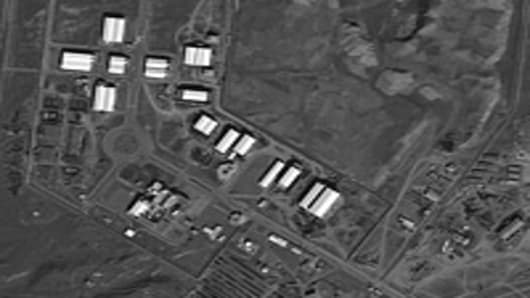In a renewed effort to secure answers about the scope of Iran's nuclear program, inspectors from International Atomic Energy Agency (IAEA) are expected to return to Tehran this week. A three-day visit in late January is understood not to have yielded conclusive results.
The visit comes as overall diplomatic progress showed signs of revival after a letter from Iran's chief nuclear negotiator Saeed Jalili requesting the resumption of talks but also as, in an alleged show of strength, Iran's 18th Fleet entered the Mediterranean Sea on Saturday for only the second time since Iran's revolution in 1979.
An Iranian Navy Commander told state-run Press TV that the fleet will carry "the message of peace and friendship to regional countries and display the might of the Islamic Republic of Iran"; the previous passage through the Suez Canal, only days after the fall of former Egyptian President Hosni Mubarak, pushed crude oil prices higher due to fears of a wider escalation in midst of the Arab Spring.
US Secretary of State Hillary Clinton told reporters after meeting with the European Union's foreign policy chief that the Iranian letter requesting the resumption of talks was "one we've been waiting for, and if we do proceed, it will have to be a sustained effort that can produce results". The EU's Catherine Ashton maintained she was "cautious and optimistic at the same time".
Although Iran maintains its nuclear ambitions are entirely peaceful, the UN’s nuclear watchdog said in its last report in November that the agency had “serious concerns regarding the possible military dimensions to Iran’s nuclear program”.
'New Cold War'
Over the weekend, British Foreign Secretary William Hague warned that if Iran’s nuclear program were to go unchecked, the potential of a “new Cold War” in the region would be a “serious disaster for world affairs”, but made it clear in comments to The Daily Telegraph that they were “not favoring the idea of anybody attacking Iran at the moment”.
Israel, which sees Iran’s nuclear ambitions as an existential threat, has repeatedly called on the international community to take concrete action. Israeli Defense Minister Ehud Barak reiterated the country’s stance during a visit to Japan on Saturday, calling for an increase in the pace of sanctions and warning of a possible escalation.
“When we say we will not leave an option off the table, we mean it,” Barak said at a press conference.
Iran, still OPEC’s second largest oil producers, is already under several sets of sanctions from the United Nations, the European Union and the United States that are severely disrupting economic activity.
It has threatened to close the Strait of Hormuz should its oil exports be embargoed, but has so far not followed through. Credit ratings agency Standard and Poor’s (S&P) said last week that Iran could also respond with "low-scale provocations", such as hindering the timely passage of tankers by introducing inspections.
More sanctions have now surfaced from SWIFT, the Belgium-based organization that facilitates most of the world’s electronic financial transactions. In a statement on its website on February 17, it said that it was “ready to discontinue its services to sanctioned Iranian financial institutions” pending clarity on EU legislation being drafted. The entity is overseen by the central banks of the G10 countries.


